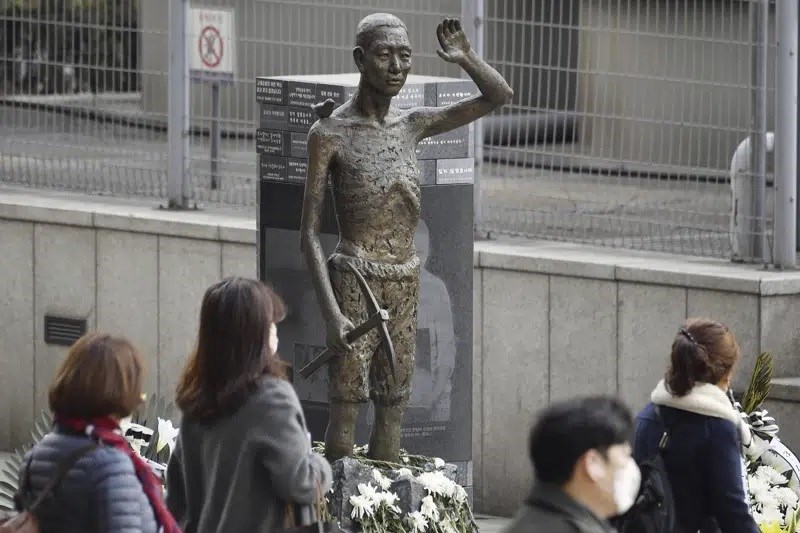WWII South Koreans denounce country's compensation as 'dirty money'
The plan, immediately welcomed by Japan and the US, does not entail an apology and contains merely voluntary contributions from the Japanese companies involved, including Mitsubishi and Nippon Steel.
-

People passing by a statue in Seoul symbolizing forced Korean workers, in March 2023. (AP)
After South Korea announced its plan on Monday to compensate citizens forced to work for Japanese companies during World War II in order to end the historic tension with Japan, the plan was decried by the citizens themselves as "dirty money".
The compensation fund was intended to come from the money that South Korean companies profited from following a 1965 reparations deal to end the "vicious cycle" with Japan.
The plan, immediately welcomed by Japan and the US, does not entail an apology, and contains merely voluntary contributions from the Japanese companies involved, including Mitsubishi and Nippon Steel.
Yang Geum-deok, who worked at a Mitsubishi factory at the time, said at a rally in Seoul, "I am 95 years old and I don't know if I die today or tomorrow. But never in my life have I felt so distressed."
"Even if I die of hunger, I would not accept that dirty money," she said as he held a poster that read, "Mitsubishi must apologize and compensate!"
Read next: South Korea reiterates refusal to supply Ukraine with military aid
Compensation for 'freedom and peace'
Close to 780,000 Koreans were forced into labor by Japan during the colonial period, according to Seoul - this number does not include the hundreds of women forced into sexual slavery by the Japanese army at the time.
Seoul has been seeking to resolve issues lingering from Japan's 1910-45 occupation of the Korean peninsula and has been ramping up ties with Tokyo amid threats from North Korea.
At the rally, victim Kim Sung-Joo said, "It was the Japanese who dragged us to Japan. Who do we turn to demand an apology?"
On Tuesday, South Korea's President Yoon Suk Yeol supported the plan heavily, stressing that it was important "for freedom, peace, and prosperity, not only bilaterally but globally".
The 1965 treaty restored diplomatic ties between both Asian nations, which brought a reparations package of nearly $800 million in grants and loans. Japan took that as a settlement of all claims concerning that time period. With that being said, Nippon Steel stated in response on Monday, "Our company's understanding is that this issue has been resolved by the 1965 agreement".

 3 Min Read
3 Min Read








